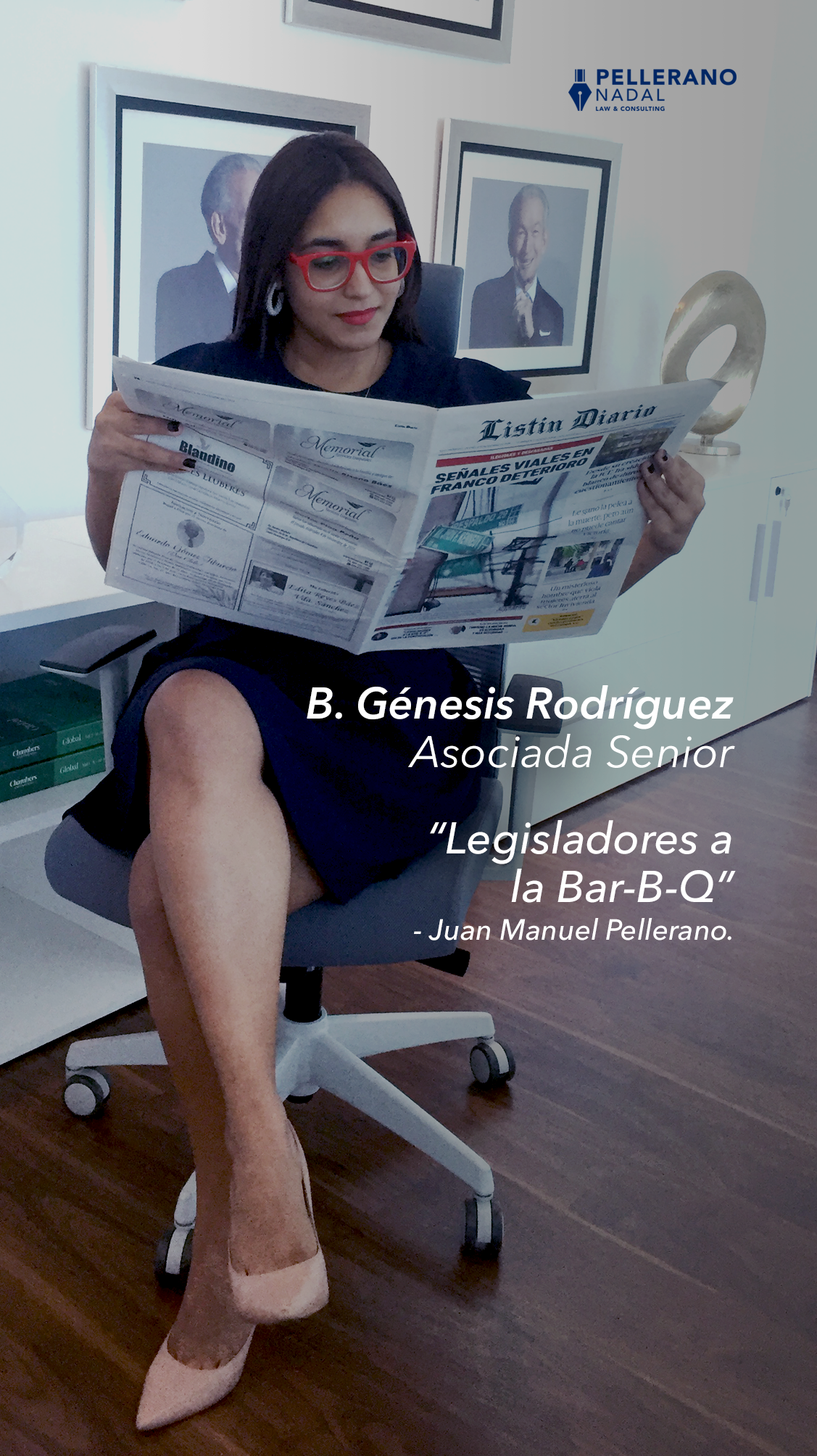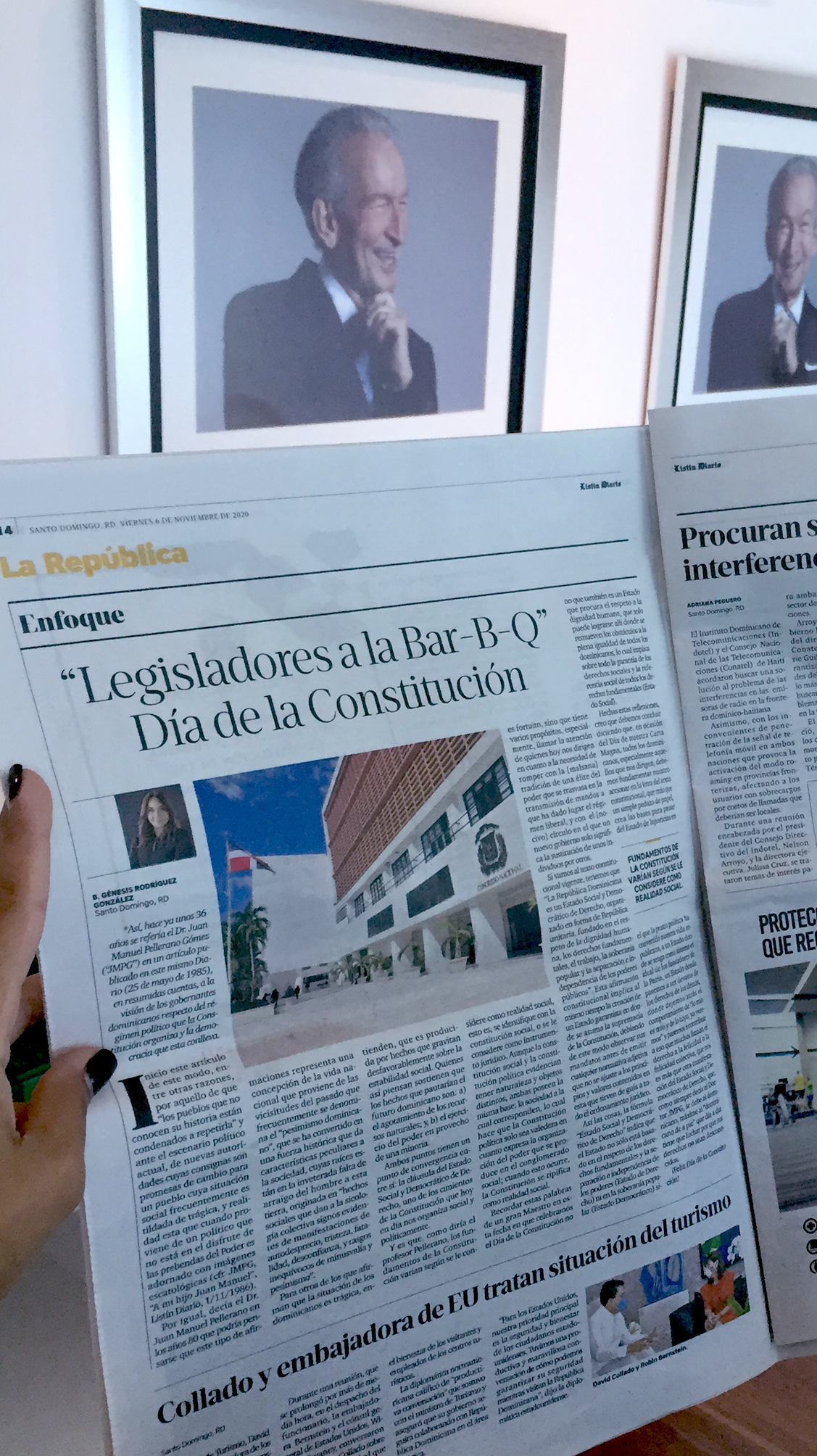“Bar-B-Q Congressmen” *: Constitution Day.
November 6, 2020
By: B. Génesis Rodríguez | Senior Associate
* Around 36 years ago Dr. Juan Manuel Pellerano Gómez referred (“JMPG”) in an article published in this same newspaper (Listín Diario, May 25, 1985), in short, to the vision of the Dominican congressmen regarding the political regime that the Constitution organizes and the democracy that it entails.
I begin this article like this, between other reasons, because of the saying that goes, "people who do not know their history are condemned to repeat it" and in the current political scenario, of new authorities whose slogans are promises of change to the people whose social status is frequently cataloged as tragic; the reality is that when it comes from a politician who is not in the enjoyment of the perks of power, the person is adorned with eschatological images (cf. JMPG, “To my son Juan Manuel”, Listín Diario, 11/1/1986).
Similarly, Dr. Juan Manuel Pellerano said in the 1980s, one could think that this type of statement represents a conception of life that comes from the vicissitudes of the past that is frequently called the "Dominican pessimism", which has become a historical force that gives peculiar characteristics to the Dominican society, whose origins are in the inveterate lack of rooting to this land, originated in "social facts that give to collective psychology obvious signs of manifestations of self-loathing, sadness, fatality, mistrust, and unequivocal traits of handicap and pessimism”.
For others who affirm that the situation of Dominicans is tragic, they understand that it is produced by events that negatively affect social stability. Those who think so, maintain that the events that would set the Dominican future are: a) the depletion of natural resources; and b) the exercise of power for the benefit of a minority.
Both points have a point of convergence with each other: the clause of the Social and Democratic State of Law, one of the fundamentals of the Constitution that today organizes us socially and politically.
As Dr. Pellerano would say, the fundamentals of the Constitution vary depending on whether it is considered a social reality, that is, it is identified with the social constitution, or it is considered as a legal instrument. Although the social constitution and the political constitution show that they are of different nature and have different objects, both have the same basis: the society to which they correspond, which makes the political Constitution only valid insofar as it expresses the organization of power that occurs in the social conglomerate; when this occurs, the Constitution is typified as a social reality.
Remembering these words of such a great professor on this date when we celebrate Constitution Day is not fortuitous; however, it has several purposes, especially, to draw the attention of those who direct us today regarding the need to break with the [unhealthy] tradition of a ruling class that is transferred in the transmission of commands to which the liberal regime has given rise, and with the [harmful] circle in which a new government only means the substitution of some individuals by others.
If we go to the current constitutional text, we have that “The Dominican Republic is a Social and Democratic State of Law, organized in the form of a unitary Republic, founded on respect for human dignity, fundamental rights, work, popular sovereignty and the separation and independence of public powers”. This constitutional affirmation implies at the same time the creation of a guaranteeing state in which the supremacy of the Constitution is assumed, thus having to observe its mandates before issuing any adjective regulations that do not conform to the principles and values contained in it that serve as a guide to the entire legal system.
Hence, the formula "Social and Democratic State of Law" means that the State is not only based on respect for fundamental rights and the separation and independence of powers (State of Law) or on popular sovereignty (Democratic State), but it is also a State that seeks respect for human dignity, which can only be achieved where obstacles to full equality are removed for all Dominicans, which implies above all the guarantee of social rights and social reference of all fundamental rights (Social State).
Having made these reflections, I think we must conclude by saying that, on the occasion of the Day of our Magna Carta, all Dominicans, especially those who lead us, must base their actions on the letter of the constitutional text, that more than a simple piece of paper, creates the bases to move from the State of Injustice in which political praxis has converted our republican life, to a State where the ideal of the founders of the Nation is taken as a system, a State where we become devotees of the rights of the others, where we leave behind the conduct of "what is mine is mine and yours, we'll see" and we go on to contribute to what many call the right to happiness or collective happiness, which is more than just another manifestation of the social and democratic state of law, which, as Doctor JMPG always said, is due to the Dominican, especially the “ordinary Dominican” who has to fight day by day so that his rights are not unknown.
Happy Constitution Day!
By: B. Génesis Rodríguez | Senior Associate
The PELLERANO NADAL team is available to answer any questions regarding this or any other topic of interest to you.


